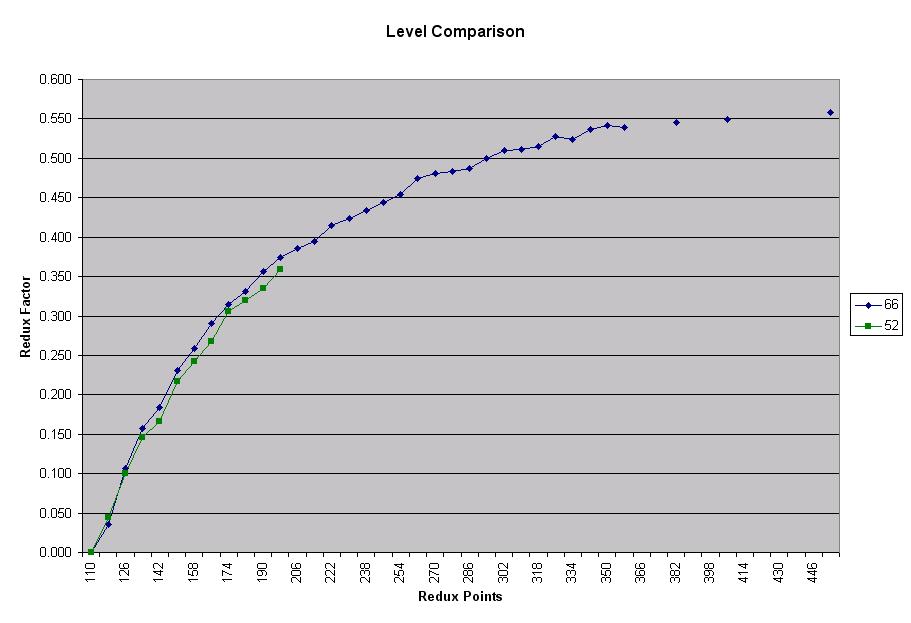Redux
Redux, also known as Total Damage Reduction, is the ability of a character to resist physical damage more effectively, resulting in less health loss, as well as reducing or even negating what should have inflicted a wound. This is not to be confused with Defensive Strength (DS), which reduces the endroll in the combat formula. Redux does not come into play until the character is successfully hit by an AS based attack, at which point it will then reduce the ensuing damage correspondingly.
Redux Points
Redux is initially achieved by training in physical skills, and the total reduction is increased by additional training in these skills. Some skills provide more redux benefit than others, and are divided into primary, secondary, and tertiary skills. Primary skills effectively provide one "point" towards redux, secondary skills provide 0.4 points, and tertiary provide 0.3 points.
The threshold for achieving redux is approximately 109 redux points, however, at lower levels, this threshold is higher. For example, a level 22 character with 114.8 did not have sufficient points to gain redux but did with 115.8 points.
Character's will receive the following message when checking out of a local inn indicating that they do not have redux. If this message is not displayed then the character does have redux.
Current skills bonus is insufficient to gain DF reduction.
Primary Skill: 1.0 point per rank
Secondary Skills: 0.4 points per rank
Tertiary Skills: 0.3 points per rank
- One-Handed Edged Weapon Training
- One-Handed Blunt Weapon Training
- Brawling Weapon Training
- Polearm Weapon Training
- Ranged Weapon Training
- Thrown Weapon Training
- Two-Handed Weapon Training
Redux Factor
An approximate redux factor can be calculated by using the coefficients and constant of a quadratic equation in the standard form:
- ax^2 + bx + c = 0
An understanding of this formula is not necessary to calculate the redux factor. The only requirements are determination of raw and critical damage values for a given attack. Averaging the results of multiple attack resolutions is recommended for greater accuracy. Avoid using damage weighted weapons and damage padded armor since they will cause erroneous results.
Where:
- x = redux factor
- a = raw damage
- b = (raw damage * 2) + crit damage
- c = raw damage + crit damage + 0.5 - actual damage taken
Note: Raw damage = (endroll - 100) * weapon damage factor
Once the a, b, c values have been calculated, they can be entered into a quadratic equation calculator. The b value must be enter as a negative.
An online calculator can be found at:
http://www.math.com/students/calculators/source/quadratic.htm
Example:
You swing a gleaming rune-scribed maul at Drangell! AS: +803 vs DS: +520 with AvD: +41 + d100 roll: +68 = +392 ... and hit for 91 points of damage! A mighty hit turns Drangell's insides to outsides!
Weapon DF: .450 (perfect maul vs scale)
Raw damage: 131.4 (292 * .450)
Crit damage: 75 (R9 crush - abdomen)
Actual damage: 91
a = 131.4 (raw damage)
b = 337.8 (raw damage * 2) + crit damage
(entered as negative)
c = 115.9 (raw damage + crit damage + 0.5 - actual damage)
Redux Factor: ~.408 (0.4077873841171237 is the X2 value from the online calculator).
Order of Operations
Spell Penalty
Training in spells will reduce a character's redux. This is a gradual reduction based on the number of spell ranks trained, but the exact formula is not currently known. There is some research which indicates that at one spell rank per level the penalty is approximately 34-38%. At two ranks per level the penalty is 100%.
Example: A level 100 character with a redux factor of .560 (56%) decides to train 100 spell ranks. This character can expect that the spell penalty will lower their redux factor from .560 to approximately .360 (36%). With 200 spell ranks or greater they will lose their redux entirely.
Note: Training in magic skills other than spells has no effect on redux.
Redux Graph
It is not currently possible to determine the redux factor from redux points alone. The relationship is roughly logarithmic and somewhat level-dependent, as the following graph indicates:
Note: Based on additional research the y-axis redux factor values are inaccurate. The relationship between redux points and redux factor is approximately 2/3rds of the these values.
